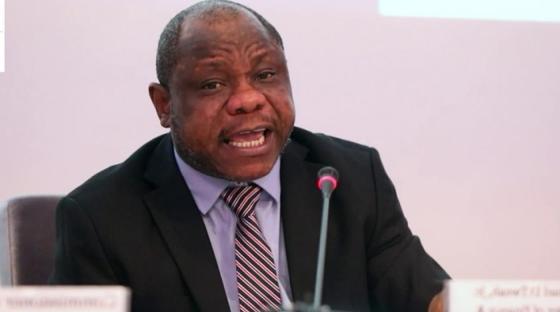Liberia: Tweah Admits Weah’s Gov’t Failure

Min. Samuel Tweah
-But blames it on Past regime, COVID-19, others
The Minister of Finance, Samuel Tweah, has in a startling admission, acknowledged the government's failure to considerably reduce poverty as envisioned in the administration’s Pro-poor Agenda for Prosperity and Development.
The admission from Tweah is a significant drawback and sting to the reelection dream of President George Weah, who upon his ascendency, promised Liberians that by the end of his six-year -term, one million Liberians would have greater income security, while absolute poverty would be 23 percent across 5 out of 6 regions.
Weah had bet on raising US$6.2 billion in revenue, grants, and loans to scaled-up investments in agriculture, infrastructure, human resource development, and social protection to achieve his ambitious promises.
Tweah, as expected, blamed the coronavirus pandemic, global financial and geo-political crises for the Weah government falling short of its goals and not as a result of any policy failure on the part of Weah to aggressively fight corruption and wasteful spending, which remain the big threats to Liberia’s social and economic development.
"The effects of these obstacles placed a significant strain on our economy, limiting the government's ability to provide fundamental infrastructure,” Tweah said in an interview yesterday with state radio, ELBC, a media engagement that was intended to project the Weah administration's achievements and defend its good governance credentials as the elections draw near.
"When President Weah took over the country, he inherited two million people living in extreme poverty,” the Minister said without providing any evidence to back his claim. “He [Weah] pledged in his PAPD to take about a million people out of poverty, that was the ambition of the PAPD. In the first year of his regime, 27 thousand people were taken out of poverty.”
Tweah's admission comes as poverty in Liberia has been on the increase, with about 50% of the country’s estimated 5.4 million people being poor.
The increase, according to the World Bank Kickoff in 2018, wiped out nearly half of the gains made postconflict, during which the poverty rate declined from 64 percent to 42 percent between 2007 and 2014.
Extreme poverty is high as well, and 2.3 million Liberians are unable to meet their basic food and non-food needs, with poverty being higher in rural areas, home to 71.7 percent of the poor, World Bank data shows.
The Weah PAPD Agenda was launched in 2018 and was intended to be the government's first step in addressing the country's drastic poverty levels. The plan focused on four main pillars: Power to the People, Economy, and Jobs, Sustaining Peace and Governance, and Transparency.
Under the "Power to the People" pillar, the government pledged to empower Liberians with tools to gain control of their lives through more equitable provision of education, health, youth development, and social protection opportunities.
As for the "Economy and Jobs" pillar, the government promised economic stability and job creation through effective resource mobilization and prudent management of economic inclusion. Under pillar three, which deals with "Sustaining the Peace," the government vowed to promote a cohesive society for sustainable development.
Under the "Governance and Transparency" pillar, Weah assured Liberians of an inclusive and accountable public sector for shared prosperity and sustainable development.
The Weah administration, according to analysts, failed to achieve much of its agenda as it was overly ambitious. Critics say serious considerations were not given to cogent issues such as lack of resources, institutional capacity, corruption, and the general difficulties of rebuilding a country affected by decades of war and instability.
Although the COVID-19 pandemic may have played a role, analysts believe that the Weah administration could have made tremendous progress if serious attention had been given to corruption, which remains the main obstacle to the development of Liberia.
Without tackling corruption, the Weah government struggles to attract the necessary investment and support needed to build strong institutions and achieve sustainable development.
Liberia, as a result of severe corruption, is ranked as one of the countries that are yet to make significant progress in the fight against corruption, according to Transparency International in its 2022 corruption perceptions index.
The index paints a picture of endemic corruption and ranks Liberia 142 out of 180 countries. The ranking, according to CENTAL, indicates that Liberia is among the worst declining countries globally in the fight against corruption.
CENTAL is the national chapter of Transparency International, and its data shows that, with the exception of Saint Lucia, Liberia has fallen 15 points since 2012.
Also, in West Africa and the Mano River Union, Liberia is the only country that has declined by six points over the last five years, it says. Since 2012, when Liberia attained its highest score of 41 on the Transparency International Corruption Index, the country has been in free-fall — topping the list of countries with stagnated and declining anti-corruption efforts, CENTAL noted.
Tweah is, however, claiming that while the government did not do much to reduce poverty, it inherited a country with rising poverty.
According to him, during the last three or four years of the previous administration, poverty was on the rise; and Weah assumed office at a time when poverty had already affected a significant portion of the population.
In 2015, he claimed that 1.7 million individuals were living in extreme poverty and that the number increased to 1.9 million in 2016 and reached two million in 2017.
“President Weah inherited this situation. However, in 2018, he took about 24,000 people out of poverty," the Minister said without providing any evidence.
